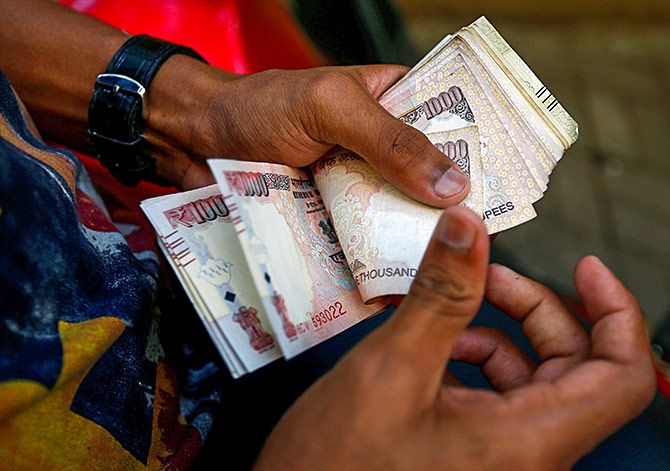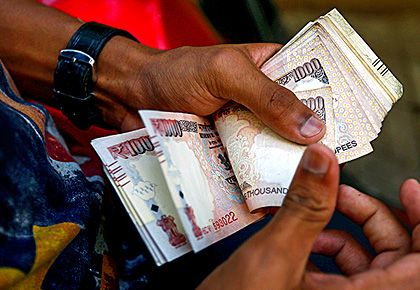Did you know that you can get a tax benefit of up to Rs 50,000 under a health insurance policy?
Naval Goel tips you on how to save tax and make more money.

Photograph: Danish Siddiqui/Reuters
Investment is an essential choice. You would be the only decision maker in going for an investment plan.
Also, you will be the one who would be bearing all of the risks related to the funding. So you need to make a plan accordingly.
Usually, you must keep things in mind about the rules of investment.
1. No funding plan is completely comfortable: There's usually certain risk involved with all.
2. Return and risk works right here in a parallel way: Higher dangers means higher return and reduced risk means lesser return however greater protection.
3. In no way ever invest in any plan blindly without checking the entire info of the plan.
The best thing which you need to do is put a purpose before your investment.
'What's that you need to achieve through your investment process?'
'Would you like to take risks or play it safe?'
These are some of the questions that need to be asked before investing.
Be clear in your mind what you are looking for through your investments.
Most taxpayers are aware about the different type of deductions and limits that comes under Sec 80C.
But there are some more deductions that a taxpayer can claim for lowering the amount of tax payable.
Yes, it is true that there are several more options of tax deductions which you are entitled to across several financial products.
However, due to lack of awareness, many people just miss these superb tax deduction methods.
Listed below are some of the tax savings options other than Section 80C:
1. Section 80CCG Rajiv Gandhi Equity Saving Scheme (RGESS)
Those who are investing in equity for the first time with a yearly income of around Rs 12 lakh can invest up to Rs 50,000 in this form of investment.
Under this, a person can claim 50 per cent tax benefit on the amount that they invested.
You can invest only once under this scheme.
So if you are investing Rs 50,000 in the same, then claim half of the amount invested under tax benefit.
Things to keep in mind
- The return on the invested amount will be subject to some market conditions.
- Under RGE, a form of equity saving, only the first investment will be liable for tax benefit. Investment made in succeeding years will not be liable for tax exemption.
- Under this scheme, the amount will be locked for at least three years.
2. Section 80D (Health Insurance)
You may be liable to get a deduction up to Rs 15,000 under Sec 80D on purchasing a mediclaim policy.
The premium of a medical insurance policy for self and family members (spouse, children and dependent parents) to secure them from health care expenses that comes under this section.
In case of senior citizens, the limit is Rs 20,000.
3. Section 80DD (Medical Treatment)
You can get a tax benefit of up to Rs 50,000 under a health insurance policy that you bought for providing quality health care service in case of need.
With 40 per cent disability is eligible for exemption under the section 80DD.
In cases where the disability is more than 80 percent, you can claim for up to Rs 1,00,000.
For the same you have to provide the medical certificate which should be issued by a medical authority for completing the whole procedure.
4. Section 80DDB (Treatment of specified critical ailments)
Under this scheme, you can claim a deduction that is for the actual amount paid for the treatment of some particular diseases under the Sec 80DDB.
A person can also claim for the same on the behalf of dependents.
For getting benefit of the same, you need to provide a medical certificate from a doctor who works in any government hospital.
Below are some diseases that are eligible for 80ddb deduction:
- Dystonia Musculorum Deformans, Motor Neuron Disease, Ataxia, Parkinsons Disease etc.
- Cancer
- Immuno-Deficiency Syndrome (AIDS)
- Chronic Renal failure
- Hemophilia
- Thalassaemia etc
5. Section 80E (Interest paid on education loan)
The interest that a person paid on education loan majorly for higher education or a full time course abroad from an approved charitable institute or financial institute will be eligible for tax deductions under Sec 80E.
A person can take education loan, for his/her spouse, children and minors as well for whom you are the legal guardian.
The maximum period for which the same is available is eight years or till the time when the interest is paid.
This is in accordance to the Rs 1 lakh deduction allowed under section 80C. But, a person can't claim the benefit for a refund of the principal amount.
Since 2011, the scope of exemption has been increased to provide coverage to all the fields of studies that includes vocational studies pursued after passing the senior secondary examination or equivalent.

Naval Goel is CEO and founder of PolicyX, an online insurance aggregator.










